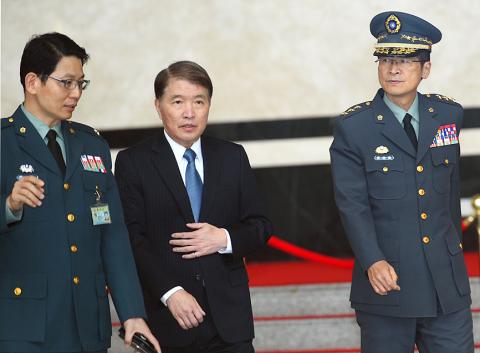Democratic Progressive Party (DPP) lawmakers yesterday identified major procedural abnormalities in a scandal-ridden navy shipbuilding program that resulted in Ching Fu Shipbuilding Co (慶富造船) securing the contract, with three top military officials, including former minister of national defense Kao Kuang-chi (高廣圻), urged to expound on their involvement in the case.
DPP Legislator Wang Ding-yu (王定宇) pointed to flaws in the tender process and subsequent program management by the Ministry of National Defense, which “revived” Ching Fu from potential disqualification.
Ching Fu, which in 2014 was awarded the NT$35.8 billion (US$1.19 billion at the current exchange rate) contract to build six minesweepers as part of a domestic warship program, secured the contract after the ministry lowered the minimum asset requirement for bidders from one-10th to one-200th of the contract’s value.

Photo: Chang Chia-ming, Taipei Times
That year, a ministry tender review committee — without its convener and deputy convener present — drew lots to pick a contractor for the minesweeper program, with Ching Fu securing the contract over CSBC Corp, Taiwan.
In 2015, Ching Fu failed to acquire export permits from its subcontractors, Italian shipbuilder Intermarine and US defense firm Lockheed Martin, but the ministry did not dissolve its contract, despite the failure.
State-run banks approved a syndicated loan of NT$20.5 billion to Ching Fu, even though the company was determined to be financially unstable, Wang said.
DPP Legislator Chuang Ruei-hsiung (莊瑞雄) questioned how Ching Fu, which has registered capital of about NT$500 million, was able to secure a tender worth NT$35.8 billion.
Kao, former navy commander-in-chief Tung Hsiang-lung (董翔龍) and former navy deputy commander-in-chief Pu Tze-chun (蒲澤春) should explain decisions that appear to be tailor-made for Ching Fu, Wang said, adding that they might have been pressured into the arrangement.
The ministry might begin the contract dissolution process with Ching Fu by the end of this month, when Intermarine and Lockheed Martin are expected to dissolve their contracts with the firm, Wang said, adding that Ching Fu is on the brink of bankruptcy and its employees have not been paid in months.
“The dissolution of Ching Fu’s contracts with its subcontractors and its bankruptcy constitute a condition for the military to terminate the contract,” Wang said.
Following dissolution of the contract, the ministry would keep Ching Fu’s NT$9 billion performance bond and demand compensation for losses, he added.

Chinese Nationalist Party (KMT) Chairman Eric Chu (朱立倫), spokeswoman Yang Chih-yu (楊智伃) and Legislator Hsieh Lung-chieh (謝龍介) would be summoned by police for questioning for leading an illegal assembly on Thursday evening last week, Minister of the Interior Liu Shyh-fang (劉世芳) said today. The three KMT officials led an assembly outside the Taipei City Prosecutors’ Office, a restricted area where public assembly is not allowed, protesting the questioning of several KMT staff and searches of KMT headquarters and offices in a recall petition forgery case. Chu, Yang and Hsieh are all suspected of contravening the Assembly and Parade Act (集會遊行法) by holding

PRAISE: Japanese visitor Takashi Kubota said the Taiwanese temple architecture images showcased in the AI Art Gallery were the most impressive displays he saw Taiwan does not have an official pavilion at the World Expo in Osaka, Japan, because of its diplomatic predicament, but the government-backed Tech World pavilion is drawing interest with its unique recreations of works by Taiwanese artists. The pavilion features an artificial intelligence (AI)-based art gallery showcasing works of famous Taiwanese artists from the Japanese colonial period using innovative technologies. Among its main simulated displays are Eastern gouache paintings by Chen Chin (陳進), Lin Yu-shan (林玉山) and Kuo Hsueh-hu (郭雪湖), who were the three young Taiwanese painters selected for the East Asian Painting exhibition in 1927. Gouache is a water-based

Taiwan would welcome the return of Honduras as a diplomatic ally if its next president decides to make such a move, Minister of Foreign Affairs Lin Chia-lung (林佳龍) said yesterday. “Of course, we would welcome Honduras if they want to restore diplomatic ties with Taiwan after their elections,” Lin said at a meeting of the legislature’s Foreign Affairs and National Defense Committee, when asked to comment on statements made by two of the three Honduran presidential candidates during the presidential campaign in the Central American country. Taiwan is paying close attention to the region as a whole in the wake of a

OFF-TARGET: More than 30,000 participants were expected to take part in the Games next month, but only 6,550 foreign and 19,400 Taiwanese athletes have registered Taipei city councilors yesterday blasted the organizers of next month’s World Masters Games over sudden timetable and venue changes, which they said have caused thousands of participants to back out of the international sporting event, among other organizational issues. They also cited visa delays and political interference by China as reasons many foreign athletes are requesting refunds for the event, to be held from May 17 to 30. Jointly organized by the Taipei and New Taipei City governments, the games have been rocked by numerous controversies since preparations began in 2020. Taipei City Councilor Lin Yen-feng (林延鳳) said yesterday that new measures by